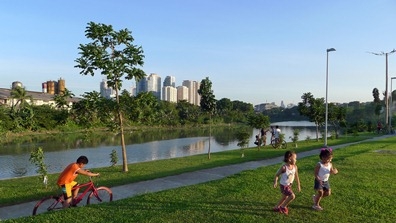Challenge
The Manila Third Sewerage Project (MTSP) helped to meet the water, sanitation and urbanization challenges identified in the government’s Medium-Term Philippine Development Plan of 2004-2010, in particular, the worsening water quality of Metro Manila resulting from rapid population growth, urbanization and industrialization. The project contributed to reducing the pollution of rivers and waterways caused by untreated domestic and industrial waste. This situation had made urban communities prone to diarrhea, cholera, skin diseases and other water-borne diseases. The project also supported the goals of the 2004 Clean Water Act and the 2008 Supreme Court decision to clean up Manila Bay. The project was also aligned with the Country Assistance Strategy of increasing access to safe drinking water and sanitation services.
Solution
The project used an integrated and innovative approach to address sewerage and sanitation issues that included the following:
• Introduced water treatment facilities within communities that sparked a revival of urban renewal activities, leading to the cleanup of riverbanks, the improvement in community facilities such as covered courts and parks as well as promotion of more social interactions. The Olandes Sewage Treatment Plant received the 2010 Project Innovation Honors Award from the International Water Association for excellence and innovation in its social, economic and sustainable design.
• Piloted the use of combined sewer and drainage systems in the Philippines.
• Applied a decentralized approach to the delivery of sewerage services that actively promoted community consultation and involvement.
• Built and expanded small treatment facilities in Metro Manila that were cost-effective and addressed the issue of land availability constraints.
• Expanded the practice of safe disposal of treated septage for use as fertilizer in areas affected by volcanic eruptions to improve soil condition and crop yield.
Results
• The project delivered improved sewerage and sanitation services with more and better treatment plants, trucks for pumping out septage and safe disposal of treated septage from the start of the project in 2005 up to 2012 for an estimated 3.3 million residents in the eastern section of Metro Manila.
• The MTSP contributed to increased sewerage coverage from about 3 percent in 2003 to 30 percent in 2012 for the same target beneficiaries.
• Sewage Management: A total of 77,137 water connections with sewerage treatment was provided from 2005 to 2012 for the same beneficiary communities.
• Septage Management: An average increase of 50,000 septic tanks de-sludged per year from 2008 to 2012 for a total of 262,012 septic tanks as of 2012 in the Manila Water Company, Inc. (MWCI) service area.
• Increased Public Awareness: A total of 3,723,934 individuals were reached by the project’s public information campaign from 2005 to 2012.
• Increased satisfaction of beneficiaries with sewerage and sanitation service delivery from 2006 to 2012, based on the Metropolitan Waterworks and Sewerage System Public Assessment of Water Services of over 300 barangays or villages in the eastern section of Metro Manila. In addition, there was widespread affirmation of health and environmental benefits to beneficiaries.
• In particular, the installation of water connections translated to better hygiene and made women and children more productive as they no longer had to spend time gathering water from outside their homes.
• Improved soil condition and crop yield from using treated septage as fertilizer in volcanic ash-affected areas, as indicated in MWCI studies.
